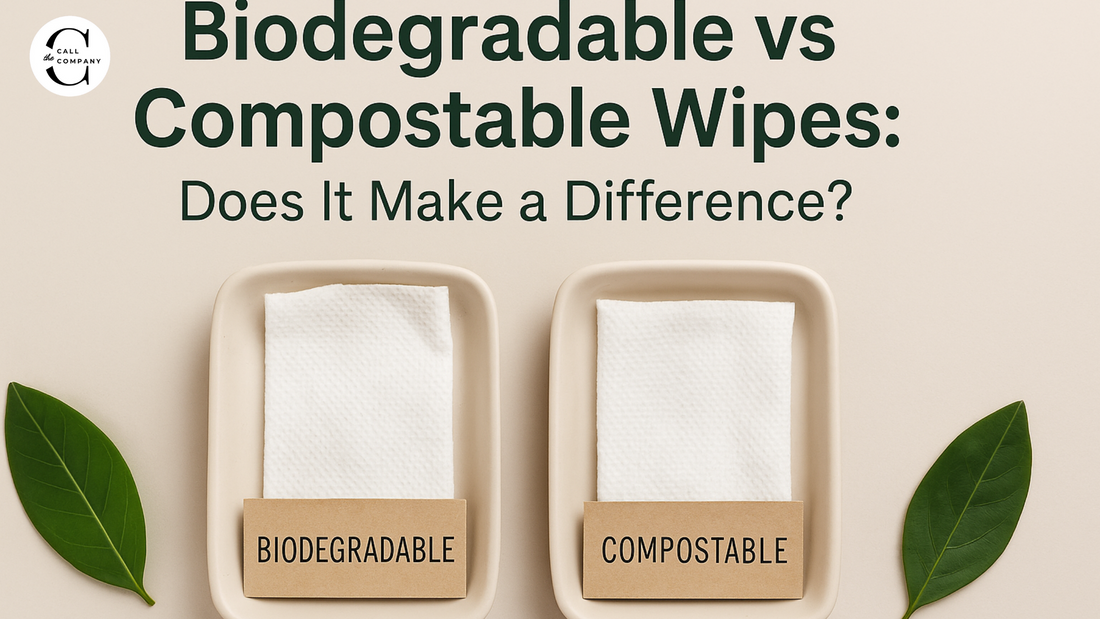
Biodegradable vs Compostable Wipes: Does It Make a Difference?
Share
In today’s eco-conscious world, more people are paying attention to the products they use daily, and wet wipes are no exception. Terms like biodegradable wipes and compostable wipes are often used interchangeably, but are they the same? And more importantly, does it make a difference when choosing between them? Let’s break it down.
Understanding Biodegradable Wipes
Biodegradable wipes are designed to break down naturally over time when exposed to bacteria, fungi, and other natural elements. These wipes return to the earth without leaving harmful residues behind, making them a far better choice compared to traditional wipes, which can take decades to decompose.
The key features of biodegradable wipes include:
-
Made from plant-based materials like bamboo, cotton, or viscose
-
Free from plastic fibers
-
Break down within months (depending on the environment)
Using biodegradable wipes means you are helping reduce landfill waste and preventing microplastic pollution in oceans and soil.
What About Compostable Wipes?
Compostable wipes take things a step further. Like biodegradable wipes, they break down naturally—but they also decompose into nutrient-rich compost under the right conditions. Compostable wipes are tested to meet specific standards (like the EN 13432 certification in Europe), ensuring they completely turn into non-toxic elements within a set timeframe when composted properly.
Key characteristics of compostable wipes:
-
Break down faster than standard biodegradable wipes under composting conditions
-
Leave no toxic residue
-
Ideal for home or industrial composting (depending on certification)
However, compostable wipes require specific environments—like higher humidity, temperature, and microbial activity—to break down fully.
Biodegradable vs Compostable Wipes: The Main Differences
| Feature | Biodegradable Wipes | Compostable Wipes |
|---|---|---|
| Decomposition Time | Few months to a year | Often within 90-180 days |
| Required Conditions | Natural outdoor conditions | Specific composting conditions |
| Residue Left Behind | None (if truly biodegradable) | None, plus they create compost |
| Certification | Not always certified | Must meet composting standards |
In short:
-
All compostable wipes are biodegradable.
-
Not all biodegradable wipes are compostable.
-
Compostable wipes have stricter environmental standards.
Why It Matters
Choosing the right wipe matters because it impacts how much waste ends up in our landfills and oceans. While both biodegradable wipes and compostable wipes are better options than traditional ones, compostable wipes are often the best choice if you have access to proper composting facilities.
If composting isn't accessible for you, biodegradable wipes are still an excellent, eco-friendly alternative. They help reduce pollution, conserve resources, and promote a healthier planet.
Tips for Choosing Eco-Friendly Wipes
When shopping for wipes, here’s what to look for:
-
Check if the packaging clearly states "100% biodegradable" or "certified compostable."
-
Avoid wipes with plastic-based fibers (like polyester).
-
Choose brands that use natural ingredients and eco-friendly manufacturing processes.
-
Look for certifications like OK Compost, EN 13432, or TUV Austria.
Conclusion
Yes, there is a difference between biodegradable and compostable wipes, and understanding that difference can help you make a smarter, greener choice. If you're committed to reducing your environmental footprint, start by switching to biodegradable wipes made from natural, sustainable materials. Small choices like this can lead to a big impact over time.
